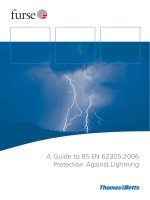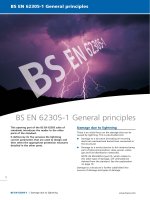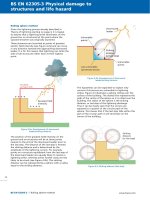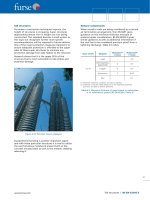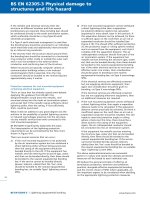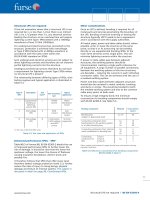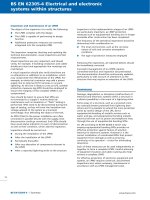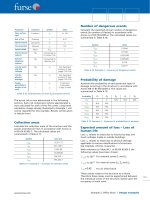Bsi bs en 01171 2015
Bạn đang xem bản rút gọn của tài liệu. Xem và tải ngay bản đầy đủ của tài liệu tại đây (955.13 KB, 24 trang )
BS EN 1171:2015
BSI Standards Publication
Industrial valves — Cast iron
gate valves
BS EN 1171:2015
BRITISH STANDARD
National foreword
This British Standard is the UK implementation of EN 1171:2015. It
supersedes BS EN 1171:2002.
The UK participation in its preparation was entrusted to Technical
Committee PSE/18/2, Industrial valves, steam traps, actuators and
safety devices against excessive pressure - Gate, globe, diaphragm
and check valves.
A list of organizations represented on this committee can be
obtained on request to its secretary.
This publication does not purport to include all the necessary
provisions of a contract. Users are responsible for its correct
application.
© The British Standards Institution 2015.
Published by BSI Standards Limited 2015
ISBN 978 0 580 82962 8
ICS 23.060.30
Compliance with a British Standard cannot confer immunity from
legal obligations.
This British Standard was published under the authority of the
Standards Policy and Strategy Committee on 31 October 2015.
Amendments/corrigenda issued since publication
Date
Text affected
BS EN 1171:2015
EN 1171
EUROPEAN STANDARD
NORME EUROPÉENNE
EUROPÄISCHE NORM
September 2015
ICS 23.060.30
Supersedes EN 1171:2002
English Version
Industrial valves - Cast iron gate valves
Robinetterie industrielle - Robinets-vannes en fonte
Industriearmaturen - Schieber aus Gusseisen
This European Standard was approved by CEN on 1 August 2015.
CEN members are bound to comply with the CEN/CENELEC Internal Regulations which stipulate the conditions for giving this
European Standard the status of a national standard without any alteration. Up-to-date lists and bibliographical references
concerning such national standards may be obtained on application to the CEN-CENELEC Management Centre or to any CEN
member.
This European Standard exists in three official versions (English, French, German). A version in any other language made by
translation under the responsibility of a CEN member into its own language and notified to the CEN-CENELEC Management
Centre has the same status as the official versions.
CEN members are the national standards bodies of Austria, Belgium, Bulgaria, Croatia, Cyprus, Czech Republic, Denmark, Estonia,
Finland, Former Yugoslav Republic of Macedonia, France, Germany, Greece, Hungary, Iceland, Ireland, Italy, Latvia, Lithuania,
Luxembourg, Malta, Netherlands, Norway, Poland, Portugal, Romania, Slovakia, Slovenia, Spain, Sweden, Switzerland, Turkey and
United Kingdom.
EUROPEAN COMMITTEE FOR STANDARDIZATION
COMITÉ EUROPÉEN DE NORMALISATION
EUROPÄISCHES KOMITEE FÜR NORMUNG
CEN-CENELEC Management Centre: Avenue Marnix 17, B-1000 Brussels
© 2015 CEN
All rights of exploitation in any form and by any means reserved
worldwide for CEN national Members.
Ref. No. EN 1171:2015 E
BS EN 1171:2015
EN 1171:2015 (E)
Contents
Page
European foreword................................................................................................................................................................ 3
1
Scope ............................................................................................................................................................................. 4
2
Normative references ............................................................................................................................................. 4
3
Terms and definitions ............................................................................................................................................ 5
4
4.1
4.1.1
4.1.2
4.1.3
4.1.4
4.2
4.2.1
4.2.2
4.2.3
4.2.4
4.3
Requirements ............................................................................................................................................................ 5
Design ........................................................................................................................................................................... 5
Materials...................................................................................................................................................................... 5
Pressure/temperature ratings............................................................................................................................ 6
Dimensions ................................................................................................................................................................. 7
Operation .................................................................................................................................................................... 9
Functional characteristics.................................................................................................................................. 11
Shell design strength............................................................................................................................................ 11
Flow characteristics ............................................................................................................................................. 12
Seat tightness .......................................................................................................................................................... 12
Sizing the operating element ............................................................................................................................ 12
Strength torque ...................................................................................................................................................... 12
5
Test procedures ..................................................................................................................................................... 13
6
Declaration of compliance ................................................................................................................................. 13
7
Designation.............................................................................................................................................................. 13
8
8.1
8.2
Marking, preparation for storage and transportation ............................................................................ 14
Marking ..................................................................................................................................................................... 14
Preparation for storage and transportation ............................................................................................... 14
Annex A (informative) Information to be supplied by the customer ................................................................ 15
Annex B (normative) Strength torque test................................................................................................................. 16
Annex C (normative) Equivalence between EN and ISO cast iron material grades ...................................... 17
Annex ZA (informative) Relationship between this European Standard and the Essential
Requirements of EU Directive 97/23/EC ...................................................................................................... 18
Bibliography .......................................................................................................................................................................... 19
2
BS EN 1171:2015
EN 1171:2015 (E)
European foreword
This document (EN 1171:2015) has been prepared by Technical Committee CEN/TC 69 “Industrial valves”,
the secretariat of which is held by AFNOR.
This European Standard shall be given the status of a national standard, either by publication of an identical
text or by endorsement, at the latest by March 2016, and conflicting national standards shall be withdrawn
at the latest by March 2016.
Attention is drawn to the possibility that some of the elements of this document may be the subject of patent
rights. CEN [and/or CENELEC] shall not be held responsible for identifying any or all such patent rights.
This document supersedes EN 1171:2002.
This document has been prepared under a mandate given to CEN by the European Commission and the
European Free Trade Association, and supports essential requirements of EU Directive 97/23/EC (PED).
For relationship with EU Directive(s), see informative Annex ZA, which is an integral part of this document.
In this new edition, the following modifications were made:
— the normative references were updated in Clause 2 and throughout the text;
— 4.1.1, 4.1.2.1, 4.1.2.3, 4.2.1, 8.1, Annex C and Table ZA.1 were revised to be in compliance with EU
Directive 97/23/EC (PED).
According to the CEN-CENELEC Internal Regulations, the national standards organizations of the following
countries are bound to implement this European Standard: Austria, Belgium, Bulgaria, Croatia, Cyprus, Czech
Republic, Denmark, Estonia, Finland, Former Yugoslav Republic of Macedonia, France, Germany, Greece,
Hungary, Iceland, Ireland, Italy, Latvia, Lithuania, Luxembourg, Malta, Netherlands, Norway, Poland,
Portugal, Romania, Slovakia, Slovenia, Spain, Sweden, Switzerland, Turkey and the United Kingdom.
3
BS EN 1171:2015
EN 1171:2015 (E)
1 Scope
This European Standard specifies the requirements for cast iron gate valves with flanged ends, socket ends
or spigot ends.
This European Standard is applicable to cast iron gate valves mainly used for industrial and general-purpose
applications. However, they can be used for other applications provided the requirements of the relevant
performance standards are met.
The range of nominal sizes covered is:
DN 40 ; DN 50 ; DN 65 ; DN 80 ; DN 100 ; DN 125 ; DN 150 ; DN 200 ; DN 250 ; DN 300 ; DN 350 ; DN 400 ;
DN 450 ; DN 500 ; DN 600 ; DN 700 ; DN 800 ; DN 900 ; DN 1 000.
The range of pressure designations covered is:
— isobaric PN 6; PN 10; PN 16; PN 25;
— isomorphic, PS 10 bar to PS 1 bar at room temperature.
2 Normative references
The following documents, in whole or in part, are normatively referenced in this document and are
indispensable for its application. For dated references, only the edition cited applies. For undated references,
the latest edition of the referenced document (including any amendments) applies.
EN 19:2002, Industrial valves — Marking of metallic valves
EN 545:2010, Ductile iron pipes, fittings, accessories and their joints for water pipelines — Requirements and
test methods
EN 558, Industrial valves — Face-to-face and centre-to-face dimensions of metal valves for use in flanged pipe
systems — PN and Class designated valves
EN 736-1, Valves —Terminology — Part 1: Definition of types of valves
EN 736-2, Valves — Terminology — Part 2: Definition of components of valves
EN 736-3, Valves — Terminology — Part 3: Definition of terms
EN 1092-2:1997, Flanges and their joints — Circular flanges for pipes, valves, fittings and accessories, PN
designated —Part 2: Cast iron flanges
EN 12266-1, Industrial valves — Testing of metallic valves — Part 1: Pressure tests, test procedures and
acceptance criteria - Mandatory requirements
EN 12266-2, Industrial valves — Testing of metallic valves — Part 2: Tests, test procedures and acceptance
criteria - Supplementary requirements
EN 12351, Industrial valves — Protective caps for valves with flanged connections
EN 12516-3:2002, Valves — Shell design strength — Part 3: Experimental method
EN 12516-4:2014, Industrial valves — Shell design strength — Part 4: Calculation method for valve shells
manufactured in metallic materials other than steel
4
BS EN 1171:2015
EN 1171:2015 (E)
EN 12570, Industrial valves — Method for sizing the operating element
EN ISO 5210, Industrial valves — Multi-turn valve actuator attachments (ISO 5210)
ISO 185:2005, Grey cast irons — Classification
ISO 1083:2004, Spheroidal graphite cast irons — Classification
ISO 2531:2009, Ductile iron pipes, fittings, accessories and their joints for water applications
ISO 5922:2005, Malleable cast iron
3 Terms and definitions
For the purposes of this document, the terms and definitions given in EN 736-1, EN 736-2 and EN 736-3 and
the following apply.
NOTE
The terms maximum allowable pressure, PS, and test pressure, PT, defined in EU Directive 97/23/EC (PED)
are equivalent to the terms allowable pressure, ps, and test pressure, pt, defined in EN 736–3.
3.1
isomorphic series
series of cast iron gate valves of a specified type and design having maximum allowable pressures which
tend to decrease as the nominal size increases (see Table 2) and having specific flanged end connections (see
4.1.3.2.1)
3.2
isobaric series
series of cast iron gate valves of a specified type and design having the same maximum allowable pressure
for all nominal sizes
3.3
strength torque
torque applied directly to the operating mechanism or, when fitted, the operating device, which the valve is
capable of withstanding
4 Requirements
4.1 Design
4.1.1
Materials
4.1.1.1
The body and bonnet materials shall be selected from Table 1 and designed in accordance with
EN 12516-4:2014.
NOTE
Materials listed in Table 1 comply with the requirements of EN 1561 for grey cast iron, EN 1562 for
malleable cast iron and EN 1563 for spheroidal graphite cast iron.
5
BS EN 1171:2015
EN 1171:2015 (E)
Table 1 — Body and bonnet materials
Graphite structure
European Standard
Designation short name
Grey cast iron
EN 12516–4:2014
EN-GJL-200
Spheroidal graphite cast iron
EN 12516–4:2014
EN-GJS-350-22-LT
EN 12516–4:2014
EN 12516–4:2014
EN 12516–4:2014
EN 12516–4:2014
EN 12516–4:2014
EN 12516–4:2014
Malleable cast iron
EN 12516–4:2014
EN 12516–4:2014
EN 12516–4:2014
EN-GJL-250
EN-GJS-350–22-RT
EN-GJS-400–18-LT
EN-GJS-400–18-RT
EN-GJS-400–15
EN-GJS-500–7
EN-GJS-600–3
EN-GJMB-300–6
EN-GJMB-350–10
4.1.1.2
The body and bonnet materials may also be spheroidal graphite cast iron in accordance with the
requirements of EN 545:2010, 4.4.
4.1.1.3
All the internal parts in contact with the fluid shall be made of a material whose corrosion
resistance to the fluid being carried is at least equal to the body and bonnet material.
4.1.1.4
Trim materials shall have a chemical composition and mechanical properties, which ensure the
mechanical integrity of the valve and shall be stated in the manufacturer's technical documentation.
The trim comprises the following:
a) stem;
b) obturator seat;
c) body seat;
d) back seat (for valves DN 50 and above, when fitted).
4.1.1.5
4.1.2
4.1.2.1
Welding and impregnation of castings of all materials are not permitted.
Pressure/temperature ratings
Isobaric series
The pressure/temperature ratings shall be in accordance with EN 1092-2:1997 for the equivalent ISO
material grade except that valves with metallic seats shall not be used above 230 °C and valves with soft
seats shall not be used above 70 °C.
To determine the equivalent ISO material grades for the EN material grades specified in Table 1, refer to
Annex C.
4.1.2.2
Isomorphic series
The pressure/temperature ratings shall be as given in Table 2.
6
BS EN 1171:2015
EN 1171:2015 (E)
Table 2 — Pressure/temperature ratings for isomorphic series
Maximum allowable pressure PS (bar) at
DN
– 10 °C/120 °C
150 °C
180 °C
200 °C
230 °C
10,0
9,0
8,4
8,0
7,4
6,0
5,4
5,0
4,8
4,4
4,0
3,6
3,4
3,2
3,0
2,5
2,3
2,1
2,0
1,9
1,0
0,9
0,8
0,8
0,7
40 to 80
100
125
150
200
250
300
350
400
450
500
600
700
800
1,6
900
1 000
1,4
1,3
1,3
1,2
4.1.2.3
For TS < - 10 °C, the body and bonnet material grades shall be EN-GJS-350-22-LT or EN-GJS-40018-LT. In this case, the TS minimum shall be not less than the temperature specified in EN 12516-4:2014,
Table 7.
4.1.3
4.1.3.1
Dimensions
Face-to-face and end-to-end dimensions
The face-to-face dimensions of flanged valves shall be in accordance with the basic series given in Table 3.
Table 3 — Basic series of face-to-face dimensions
Series
Isomorphic
PN 6, PN 10, PN 16
PN 25
DN
40 to 1 000
40 to 500
40 to 1 000
40 to 600
40 to 400
Basic series
(according to EN 558)
14
14
3, 15, 29, 30
19, 4, 15, 26
45
The end-to-end dimensions of valves with socket or spigot ends are given in the manufacturer's technical
documentation.
7
BS EN 1171:2015
EN 1171:2015 (E)
4.1.3.2
4.1.3.2.1
Body ends
General
The manufacturer's technical documentation shall indicate the type and dimensions of valve body ends, and
reference to the relevant European Standard.
4.1.3.2.2
Flange end connections
Flanges shall be in accordance with EN 1092-2.
Flanges can be an integral part of the valve body or adjustable flanges on a collar. Flanges, which are an
integral part of the body, may have supports, which permit a stable installation of the valve.
For isomorphic gate valves, the flange facing and mating dimensions shall be PN 10.
4.1.3.2.3
Spigot end connections
Spigot ends shall be compatible with the adjacent piping.
4.1.3.2.4
Socket end connections
The socket ends shall be compatible with the adjacent piping. They may have a seal housing with clearance
to allow angular displacement after assembly.
4.1.3.3
Body end port inside diameter
The body end port shall be circular. For unlined valves, the body end port inside diameter shall be not less
than the nominal inside diameter specified in Table 4.
For isomorphic gate valves the dimensions for PN 10 shall be used.
8
BS EN 1171:2015
EN 1171:2015 (E)
Table 4 — Nominal inside diameter of the body end port
DN
40
50
65
80
50
63
78
40
63
78
38
50
63
76
100
100
150
150
150
150
250
300
350
400
450
500
600
700
800
900
4.1.4.1
50
40
PN 25
100
200
Operation
PN 16
100
125
4.1.4
PN 6, PN 10
Dimensions in millimetres
1 000
125
200
250
300
343
394
445
495
597
695
800
900
1 000
125
200
250
300
343
394
445
495
597
695
793
889
991
125
200
250
300
336
387
438
488
590
692
788
889
991
Maximum height
The maximum height of gate valves without gearbox, actuator or position indicator (see Figure 1), shall be as
given in Table 5.
9
BS EN 1171:2015
EN 1171:2015 (E)
a) Valve with non-rising stem
b) Valve with rising stem (in fully open position)
Figure 1 — Valve
10
BS EN 1171:2015
EN 1171:2015 (E)
Table 5 — Maximum height
DN
40
50
65
80
100
125
150
200
350
400
425
475
575
650
700
600
700
800
900
1 000
560
610
720
875
950
1 675
1 150
500
510
1 125
350
450
480
1 200
1 025
400
h2
850
250
300
4.1.4.2
h1
Dimensions in millimetres
1 275
1 350
1 500
1 700
1 800
2 000
2 400
2 500
1 440
1 900
2 070
2 250
2 430
2 850
3 250
3 750
4 150
4 450
Operating device
If the valve is to be operated by an actuator then the valve/actuator attachment shall be in accordance with
EN ISO 5210.
4.1.4.3
Operating direction
The valve shall be closed by turning the handwheel in a clockwise direction when viewed from above the top
of the valve.
4.2 Functional characteristics
4.2.1
Shell design strength
The shell strength resistance shall be in accordance with EN 12516-4:2014.
If the shell strength resistance is validated by an experimental method, it shall be according to
EN 12516-3:2002. The experimental test pressure pt, exp shall be the greatest value of pt, exp calculated along
the P/T rating.
NOTE
To comply with Directive 97/23/EC (PED), the use of EN 12516–3 is limited to valves for which
PS x DN < 3 000 bar.
11
BS EN 1171:2015
EN 1171:2015 (E)
4.2.2
4.2.2.1
Flow characteristics
General
The seat bore shall be either full bore or reduced bore. When the gate valve is fully open, no internal part
shall influence the flow of fluid.
If any lugs, required to facilitate the fitting of seat rings, intrude into the bore, it shall be clearly indicated in
the manufacturer's technical documentation.
4.2.2.2
Gate valves with obturator recess in the body
The obturator of a wedge gate valve shall be designed so that the obturator seating surfaces do not contact
the body seats until near the point of closure. When a wedge gate valve obturator is closed, the wedge shall
ride high on the body seats to allow for wear and deformation under pressure.
The seating surfaces can be:
a) metallic seats
1) body and/or obturator seat;
2) body and/or obturator seat ring;
3) body and/or obturator hard facing;
b) soft seats
1) the soft seats can be fixed on the obturator or on the body.
4.2.2.3
Gate valves without obturator recess in the body
The seating surfaces shall be formed by a resilient coating on the obturator.
The coating shall enable the performance required in the relevant performance standards.
4.2.3
Seat tightness
The allowable rate for seat tightness tests specified in EN 12266-1 shall be:
— elastomeric or polymeric seating – Rate A;
— other seatings – Rate B.
The allowable rate for the back seat tightness test specified in EN 12266-2 shall be Rate A.
4.2.4
Sizing the operating element
For handwheel operated valves, the minimum size of the handwheel shall be determined in accordance with
EN 12570. The handwheel size shall be selected such that the valve can be operated when the fluid pressure
is equal to the maximum allowable pressure at 20 °C and can be seated or unseated against a differential
pressure of not less than the maximum allowable pressure at 20 °C.
When specified by the customer it is permitted to use a lower fluid pressure and differential pressure than
the maximum allowable pressure at 20 °C.
4.3 Strength torque
When tested in accordance with Annex B, the minimum strength torque shall correspond to one of the four
categories given in Table 6, to be specified by the purchaser.
12
BS EN 1171:2015
EN 1171:2015 (E)
Table 6 — Minimum strength torque
DN
Category 1
40
80
65
100
100
190
50
80
125
150
200
250
300
350
400
450
500
Category 3
In Newton metres
90
180
500
130
225
625
Category 2
90
100
150
160
190
190
240
240
300
300
390
390
390
200
250
300
400
500
600
700
180
225
300
375
550
700
800
925
450
1 050
750
1 550
600
900
975
800
1 050
1 000
1 575
900
Category 4
1 275
1 300
1 800
2 050
2 300
2 550
2 800
NOTE
Category 1 is intended for valves operated by handwheel, Category 2 and 3 for valves operated by T-key
and Category 4 for valves operated by ring key and bar.
5 Test procedures
5.1 Each valve shall be pressure tested by the manufacturer prior to despatch in accordance with
EN 12266-1.
5.2 Additional tests of finished valves can also be carried out to the requirements of EN 12266-2. The
customer shall specify which tests are required.
6 Declaration of compliance
The manufacturer shall declare compliance to this standard by marking the valves with the number of this
standard.
7 Designation
Gate valves complying with this European Standard shall be designated by the following elements in the
same order:
— “gate valve”;
— “EN 1171”;
— body end type i.e. flanged, spigot, socket;
— symbol “DN” and the number;
13
BS EN 1171:2015
EN 1171:2015 (E)
— pressure designation;
— material of the body and bonnet;
— for flanged valves, the face-to-face dimensions basic series number;
— restrictions of maximum service temperature or pressure (see 4.1.2).
8 Marking, preparation for storage and transportation
8.1 Marking
8.1.1
The marking shall be in accordance with EN 19.
8.1.2 The pressure Class or the maximum allowable pressure of the weakest component of the valve shall
be marked on the valve.
8.1.3
The following supplementary markings shall be marked on the valve:
a) maximum service temperature (°C) only if above 70 °C (item 7);
b) standard number (item 11);
c) year of manufacture (item 18).
If the markings are on a plate, this plate shall be in a corrosion resistant material and it shall be securely
fixed to the body by adhesive or fastening.
8.2 Preparation for storage and transportation
Each valve shall be drained of any test liquid. The body ends shall be protected to prevent the introduction of
foreign materials and moisture. In the case of polymeric or elastomeric seated valves the seatings shall also
be protected from ultraviolet light.
When protective caps are used for valves with flanged end connections they shall be in accordance with
EN 12351.
Polymeric or elastomeric seated valves shall be delivered such that the seating material is not in
compression. All other valves shall be delivered with the obturator in the closed position.
14
BS EN 1171:2015
EN 1171:2015 (E)
Annex A
(informative)
Information to be supplied by the customer
The following information should be provided in the enquiry and/or order:
a) this standard i.e. EN 1171;
b) body ends i.e. flange, spigot or socket (see 4.1.3.2);
c) the nominal valve size (see Clause 1);
d) the pressure designation (see Clause 1);
e) the material of the body and bonnet (see 4.1.1.1 and 4.1.1.2);
f)
for flanged end valves, the basic series number of the face-to-face dimensions (see 4.1.3.1);
for spigot or socket ends valves the type of pipes (outside diameter) (see 4.1.3.2.3 or 4.1.3.2.4);
g) the type of operating device (see 4.1.4.2);
h) the differential pressure across the obturator if less than the maximum at 20 °C for the particular
pressure designation (see 4.2.4);
i)
the strength torque category (see 4.3).
15
BS EN 1171:2015
EN 1171:2015 (E)
Annex B
(normative)
Strength torque test
B.1 The number of operating turns corresponding with the maximum travel of the obturator shall be
determined before testing.
B.2 The fully closed obturator shall be submitted to a differential pressure equal to the maximum
allowable pressure (PS) of the valve. Under this pressure, the relevant torque specified in Table 6 shall be
applied gradually. For category 4 strength torque this test shall include simultaneously a bending moment
of 1 500 Nm at the stem cap.
B.3
The same torque(s) shall be applied to the valve with the obturator in the fully open position.
B.4 The valve with the obturator fully closed shall then be subject to a seat tightness test as described in
4.2.3.
B.5 After these tests, the number of operating turns corresponding with the maximum travel of the
obturator shall remain within + 5 % of the number determined before testing and no damage shall be
perceptible during operation of the valve over the maximum travel.
16
BS EN 1171:2015
EN 1171:2015 (E)
Annex C
(normative)
Equivalence between EN and ISO cast iron material grades
For the purposes of determining the applicable pressure/temperature rating in EN 1092-2:1997, the
following EN material grades shall be considered equivalent to the ISO grades specified.
Table C.1 — Body and bonnet materials — ISO grades equivalent to EN material grades
Graphite
structure
Grey cast iron
Spheroidal graphite
cast iron
European Standard
International
Standard
Grade
EN 12516–4:2014
EN-GJL-200
ISO 185:2005
200
EN 12516–4:2014
EN-GJS-350–22-LT
ISO 1083:2004
350–22
EN-GJS-400–18-LT
ISO 1083:2004
400–18
EN 12516–4:2014
EN 12516–4:2014
EN 12516–4:2014
EN 12516–4:2014
EN 12516–4:2014
EN 12516–4:2014
EN 12516–4:2014
Malleable cast iron
Grade
EN 545:2010
EN 12516–4:2014
EN 12516–4:2014
EN-GJL-250
EN-GJS-350–22-RT
EN-GJS-400–18-RT
EN-GJS-400–15
EN-GJS-500–7
EN-GJS-600–3
EN-545–420–5
EN-GJMB-300–6
EN-GJMB-350–10
ISO 185:2005
ISO 1083:2004
ISO 1083:2004
ISO 1083:2004
ISO 1083:2004
ISO 1083:2004
ISO 2531:2009
ISO 5922:2005
ISO 5922:2005
250
350–22
400–18
400–15
500–7
600–3
420–5
B30–06
B35–10
17
BS EN 1171:2015
EN 1171:2015 (E)
Annex ZA
(informative)
Relationship between this European Standard and the Essential Requirements
of EU Directive 97/23/EC
This European Standard has been prepared under a mandate given to CEN by the European Commission and
the European Free Trade Association to provide a means of conforming to Essential Requirements of the
New Approach Directive 97/23/EC (Pressure Equipment Directive).
Once this standard is cited in the Official Journal of the European Union under that Directive and has been
implemented as a national standard in at least one Member State, compliance with the clauses of this
standard given in Table ZA.1 confers, within the limits of the scope of this standard, a presumption of
conformity with the corresponding Essential Requirements of that Directive and associated EFTA
regulations.
Table ZA.1 — Correspondence between this European Standard and Directive 97/23/EC
Clause(s)/sub-clause(s)
of this European
Standard
Essential Safety
Requirements
Annex I of Directive 97/23/EC
(PED)
Nature of requirement
4.1.2, 4.2.1
2.1
General design
4.2.1
2.2.4
Experimental design method
4.1.1.1, 4.2.1
8.1
2.2.3
3.3
Calculation method
Marking and labelling
WARNING — Other requirements and other EU Directives may be applicable to the product(s) falling within
the scope of this standard.
18

